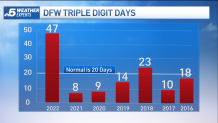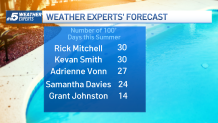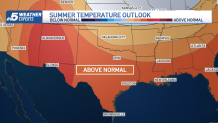
Summer-like heat is building! It is possible the first triple-digit day arrives in North Texas next week. The average date for the first 100° day is July 1.
In an average year, Dallas-Fort Worth International Airport records 20 triple-digit days. Here is a look at the number of 100° days over the past few years:

Here is what the NBC 5 Meteorologists are saying for this summer: Rick and Kevan are betting on a higher-than-normal number of triple digits days, while Grant's number is below average. Adrienne and Samantha are going a little higher than normal.
Get DFW local news, weather forecasts and entertainment stories to your inbox. Sign up for NBC DFW newsletters.
The numbers vary. So, who is correct? Only time will tell!

NOAA's Climate Prediction Center does not put out an exact number for this summer forecast, but they are expecting a summer with above-normal heat.
Be sure to check back at the end of the summer for final heat numbers.

HERE COMES EL NIÑO: IT'S EARLY AND IS EXPECTED TO ADD HEAT
Weather Connection
Connecting you with your forecast and all the things that make North Texas weather unique.
On Thursday, the Climate Prediction Center issued an El Niño advisory, saying El Niño conditions are present and are expected to gradually strengthen into the Northern Hemisphere winter 2023-24.
It formed a month or two earlier than most El Niño do which “gives it room to grow,” and there’s a 56% chance it will be considered strong and a 25% chance it reaches supersized levels, said climate scientist Michelle L’Heureux, head of NOAA’s El Niño/La Niña forecast office.
Usually, an El Niño mutes hurricane activity in the Atlantic, giving relief to coastal areas in states from Texas to New England, Central America and the Caribbean, weary from recent record busy years. But this time, forecasters don’t see that happening, because of record-hot Atlantic temperatures that would counteract the El Niño winds that normally decapitate many storms.
Hurricanes strengthen and grow when they travel over warm seawater, and the tropical regions of the Atlantic Ocean are “exceptionally warm."



